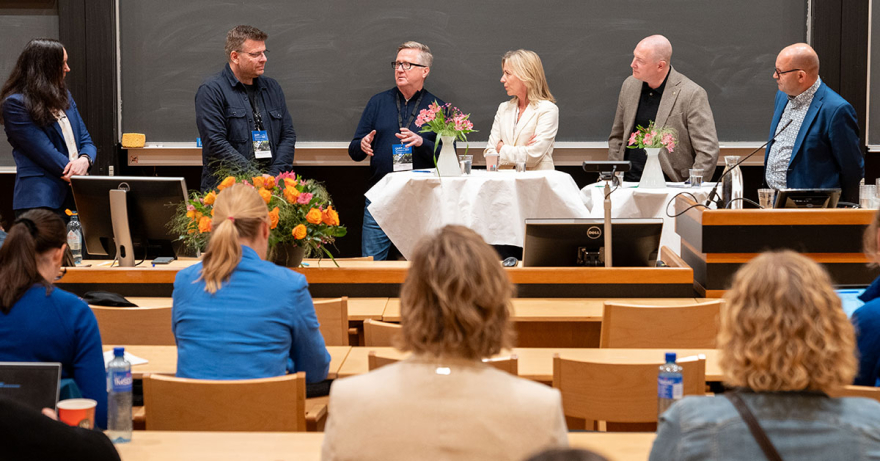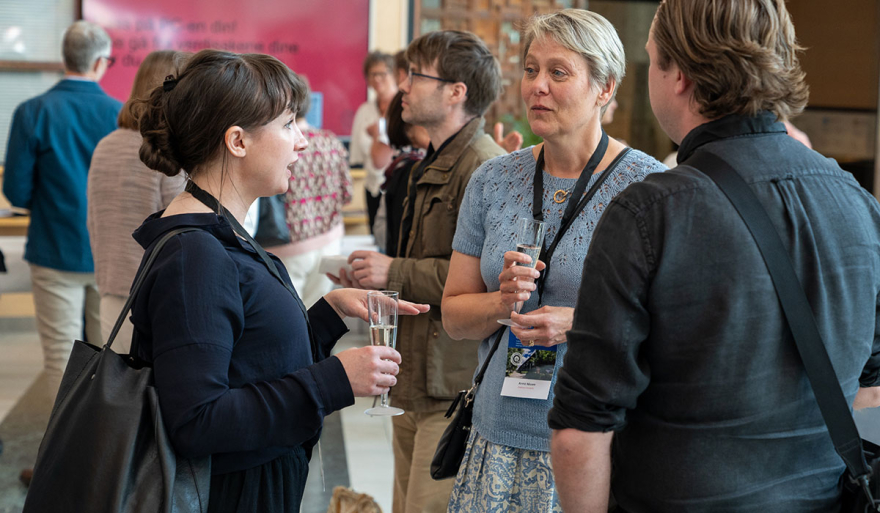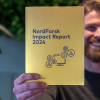Kirsti Klette, one of the Nordic region's leading classroom researchers, has headed QUINT since its start in 2018. She explains that if you want your research to have impact, you need to work on a broad scale.
“For us, one thing has been very important: the willingness and ability to think and act broadly. We've been involved in everything from traditional academic publishing to discussions with journalists, politicians, and other decision-makers, to creating learning resources and working closely with teachers and head teachers on various issues.”
“We've been very fortunate to have researchers who are willing to work in this way. In the past, I've experienced research collaborations where researchers, in a way, don't want to ‘soil’ themselves by talking to those in the field of practice or at the political level. But that hasn't been the case here; there has been an enormous willingness to reach out with the research.”
What impact have you had?
“We have had impact in many different ways. First and foremost, we have had academic impact by contributing to close co-operation between Nordic researchers who have not previously worked together. We have created a new Nordic network on teaching quality, where we meet to discuss and define teaching quality, with particular focus on observational and classroom studies.”
“This collaboration has also resulted in a strong network of young Nordic and European researchers, including PhD students and post-docs. We've nurtured a new generation of researchers focussing on teaching. These researchers are now setting the tone and initiating new projects in both the Nordic region and Europe.”
Significant political impact
Klette also emphasises that the project has had impact on Nordic politicians.
“We've had major impact at policy level in the Nordic countries, particularly in Norway, Denmark and Iceland. QUINT researchers have been used as experts in national initiatives and have participated in the design of national curricula and measures related to the COVID-19 pandemic. In Denmark, Iceland and Norway, our researchers are in regular contact with the authorities, including as leaders and members of national expert committees. Our researchers present research-based views on everything from COVID research to teaching quality. As early as 2021, we were able to present research documenting how the pandemic is challenging the Nordic school model.”
Klette cites several concrete examples of how QUINT has influenced national school policy. In Norway, Marte Blikstad-Balas has chaired a national expert group for digital learning analytics, Inga Staal Jenset has chaired a national committee on lecturer education, and Klette herself has been part of a national committee for data sharing.
“In Iceland, QUINT has had tremendous impact on the Ministry of Education and Children, especially after low Icelandic scores on the PISA tests. QUINT researchers were invited to the ministry to discuss how to improve the quality of teaching, and our results became just as important as the PISA results. And in Denmark, QUINT researchers have participated in national expert committees that have addressed issues related to learning during the pandemic, to new curricula, and the quality of teaching in the Danish school system. In this way, the research conducted in QUINT is both directly and indirectly involved in the development of school policy, for example in new curricula and how to think systematically about quality in teaching.”


QUINT in numbers
QUINT has worked systematically to document the outputs, outcomes and impact of its research in NordForsk's documentation platform Researchfish. Here are some key figures from the platform as of June 2024.
- 226 publications
- 514 engagement activities
- 27 different types of influence on policy, practice, patients & the public
- 60 instances of awards & recognition
- 37 instances of further funding
- 18 other forms of new collaborations & partnerships
- 2 new research datasets and databases
Sharing of data
Klette says that QUINT has also developed new methods for sharing data.
“I'd say we're quite at the forefront in this area, because we had established the Teaching Learning Video Lab, where we developed a dataset and a platform for sharing data. It's called QuintLISANordicDataSet, and it's given researchers the opportunity to share video data across national borders. This sharing has, in turn, led to many people being able to utilise the data. For example, around 50 master's theses have been written on the Norwegian data from this material. This shows that sharing data is a very good idea, especially given that there is a lot of data we are unable to analyse on our own.”
Clear public profile
QUINT has also had significant influence in the public sphere. Participants in the project have had many media appearances, including interviews, podcasts, debates, webinars and the like.
“We have frequently participated in public events, which has been important in communicating our findings to a wider audience. But this must also be seen in the context of the project's high level of activity. We have published more than 200 articles, reports and books, and we have initiated more than 20 new projects, 11 of which are major research projects supported by the Nordic Research Councils. So it goes without saying that we have a lot to communicate.”
To other researchers who want to achieve impact, Klette offers the following advice:
“Think strategically from day one and think broadly. Be willing to communicate with different levels, from teachers to ministries. Collaborate with researchers who are willing to engage in broad dissemination activities, and get institutional help to think about how to create and measure impact.”

About QUINT
Nordic Centre of Excellence investigating teaching quality in the Nordic countries via video recordings taken in Nordic classrooms.
Duration: 2018–2024
Participants: Approximately 70 researchers from eight institutions in Norway, Sweden, Denmark, Iceland and Finland
Funded by NordForsk, additional funding partners include the Academy of Finland, the Swedish Research Council, the Research Council of Norway, the Ministry of Education and Children (Iceland), and the Danish Agency for Science and Higher Education.
During the research period QUINT also produced and published several videos on the results and findings.


